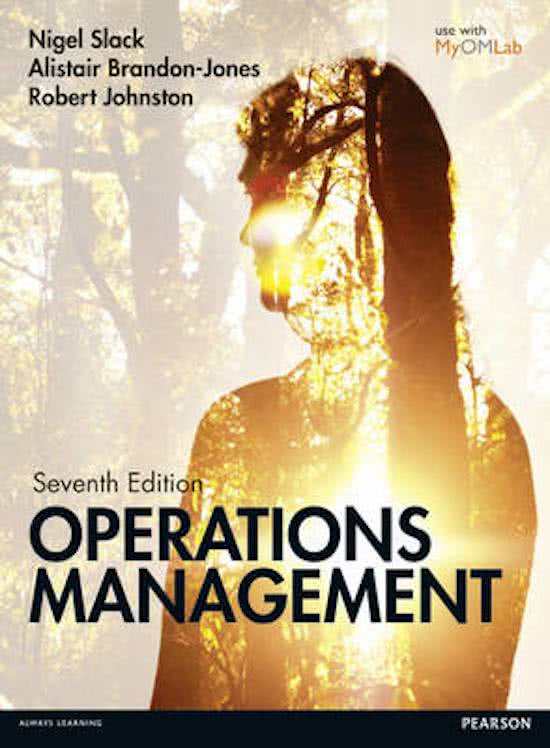Summary Operations Management
Slack, Brandon-Jones, Johnston
7th Edition
,Chapter 2
OPERATIONS PERFORMANCE IS VITAL FOR ANY ORGANIZATION
Operations management can ‘make or break’ a business. The operations function gives the ability to
compete by providing the ability to respond to customers and by developing the capabilities that will
keep it ahead of its competitors in the future.
The triple bottom line
The triple bottom line is a straightforward idea – simply that organizations should measure themselves
not just on the traditional economic profit that they generate for their owners, but also on the impact
their operations have on society and the environment. The influential initiative that has come out of this
triple bottom line approach is that of ‘sustainability’. The assumption underlying the triple bottom line ist
that a sustainable business is more likely to remain successful in the long term, than one which focuses
on economic goals alone. Only a company that produces a balanced TBL is really accounting for the total
cost of running its operation (see figure 2.2, page 39).
Sustainable business = creates an acceptable profit for its owners, but minimized the damage to the
environment and enhances the existence of the people with whom it has contact. It balances economic,
environmental and societal interests.
Operations should judge themselves on the triple bottom line principle of people, planet and profit
The social bottom line
= businesses should accept that hey bear some responsibility for the impact they have on society and
balance the external ‘societal’ consequences of their actions with the more direct internal consequences,
such as profit.
At the level of the individual, social bottom line performance means devising jobs and work patterns
which allow individuals to contribute their talents without undue stress. At a group level, it means
recognizing and dealing honestly with employee representatives. In addition, businesses are also part of
the larger community and should be recognizing their responsibility to local communities by helping to
promote their economic and social well-being.
The environmental bottom line
= the extent to which business activity negatively impacts on the natural environment.
Operations managers cannot avoid responsibility for environmental performance. It is often operational
failures which are at the root of pollution disasters and operations decisions which impact on longer-
term environmental issues.
The economic bottom line
= operations managers must use the operation’s resources effectively.
Five aspects of performance have a significant impact on economic performance (see figure 2.3, page 41)
It can reduce costs of producing its services products
It can achieve customer satisfaction through good quality and service
, It can reduce the risk of operational failure, because well designed and well-run operations
should be less likely to fail, ad should be able to recover fast if they fail.
It can reduce the amount of investment that is necessary to produce the required type and
quantity of products and services by increasing the effective capacity of the operation and by
being innovative in how it uses its physical resources.
It can provide the basis for future innovation by learning from its experience of operating its
processes, so building a solid base of operations skills, knowledge and capability within the
business.
All operations should be expected to contribute to their business by controlling cost, increasing revenue,
reducing risks, making investment more effective and growing long-term capabilities.
How operations can affect profits
Operations management can have a very significant impact on a business’s financial performance. Even
when compared with the contribution of other parts of the business, the contribution of operations can
be dramatic (read examples in book, page 41-43)
The ‘stakeholder’ perspective on operations performance
The triple bottom line is an increasingly adopted approach to reaching a broad and comprehensive
assessment of operations performance, but there are other similar concepts. One is to judge the impact
an operation has on its stakeholders.
Stakeholders = people and groups who have a legitimate interest in the operation’s activities
- Internal (employees etc.)
- External (customers etc.
Some external stakeholders have a direct commercial relationship with the organization, others do not.
In not-for-profit operations, the two stakeholder groups can overlap. In any kind of organization, it is a
responsibility of the operations function to understand the objectives of its stakeholders and set its
objectives accordingly. Both stakeholders and organizations have requirements from one another.
(See Table 2.3, page 45)
Corporate social responsibility (CSR)
According to the UK government’s definition: CSR is essentially about how business takes account of its
economic, social and environmental impacts in the way it operates – maximizing the benefits and
minimizing the downsides. CSR can be seen as the voluntary actions that business can take, over and
above compliance with minimum legal requirements, to address both its own competitive interests and
the interests of wider society.
According to Marks & Spencer, CSR is listening an responding to the needs of a company’s stakeholders.
This includes the requirements of sustainable development. Building good relationships with employees,
suppliers and wider society is the best guarantee for long-term success.
The five operations performance objectives
Running an operation at an operational day-to-day level requires a tightly defined set of objectives.
These are the five basic ‘performance objectives’ and they apply to all types of operation.
Quality – not making mistakes, satisfying customers by providing error-free goods
Speed – minimizing time between customer request and delivery, thus increasing availability and
giving them a speed advantage






